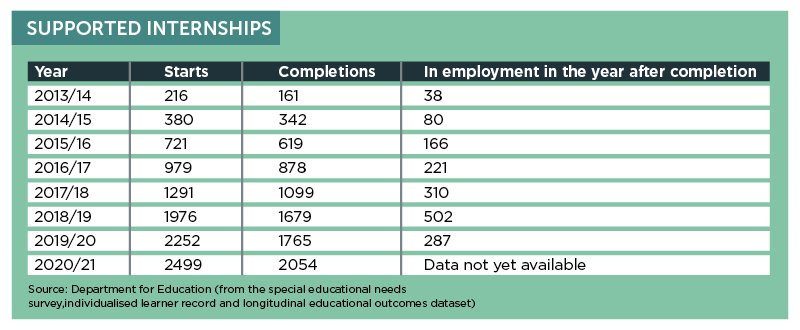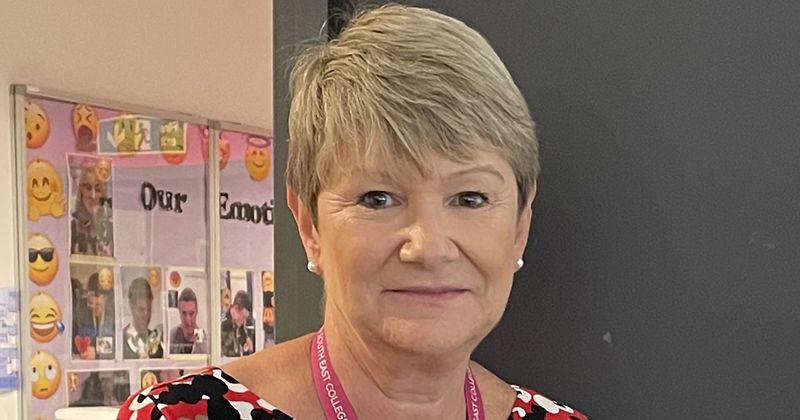Just one in four special educational needs students remain in employment a year after their supported internship has ended, FE Week can reveal, prompting calls for more dedicated aid for the scheme.
Those delivering the “life-changing” programmes say that learners still need support once they have moved from internship into paid work, and the government should help fund that assistance as it looks to double the number of placements.
Supported internships are structured programmes for SEND students aged 16 to 24 who have an education health and care plan (EHCP) to get into sustained employment, with placements lasting for six months to a year.
They are enrolled by a learning provider, but spend a significant amount of time – often between two or four days a week – in work with an employer and assisted by a dedicated job coach.
The DfE has committed £18 million over the next three years to nearly double the numbers taking advantage of the scheme, with ambitions for 4,500 on programmes each year by 2025.
But data released to FE Week under the UK’s Freedom of Information laws has revealed that just a quarter of students on supported internships found employment in the year following completion.
The internships have steadily grown from just 216 starts in 2013/14 to 2,499 starters in 2020/21, with that most recent intake representing a near doubling of the 1,291 seen four years prior, suggesting that the government target is achievable.

Completion rates for the programmes is an average of nearly 84 per cent since 2013/14, according to the data.
A study by Cooper Gibson Research in 2020 (which interviewed 42 providers and eight wider stakeholders involved in the programmes) reported that most providers estimated at least half of their students on supported internships secured paid work at the end of their placement.
Providers which have reported strong employment figures have said they have laid on longer-term support from their own funds to help learners beyond the end of the programme. But more government support would bolster that, they say.
The Hive College in Birmingham, which supports around 12 people on supported internships each year with around half moving into paid employment, runs a three year ‘live’ programme in which learners do one day a week in work for their first two years before the supported internship in the third year.

Ruth Martin, placements co-ordinator at the college said: “We have always offered a three-year [programme] and post placement support. We will continue to monitor those students, we will contact them directly, but also the companies can contact us if there is an issue, and we can go in and support.
“That’s really key, and I think that’s where other places fall down. That’s a financial investment – we can’t claim on that money, that is us off our own back because we want it to be sustainable.”
Kent-based Bemix, another provider for supported internships, also runs a pre-internship year. In the last few months it has also begun piloting an additional work coach who can be the “first line of response” when one of its graduates gets into difficulty.
Matt Clifton, chief executive, said it was more effective for the provider to do that than a Job Centre Plus or Department for Work and Pensions worker, as it already has a relationship with the learner.
“What we hope to demonstrate is that that brings a value to the public sector that far outweighs what needs to be spent on it,” he added.
“What we hope to demonstrate is that it’s that relationship that brings a value to the public sector that far outweighs what needs to be spent on it,” he added.

Bemix, which has 45 young people on supported internships this year, also reports around half moving into paid employment following their internship, but hoped the pilot will bolster that number (and the numbers remaining in work).
London South East Colleges runs a number of supported internship models. One features a tie-up with Mencap for those with severe learning difficulties in which Mencap works one-to-one with the learner in the workplace. Another is a partnership with Bromley local authority, Project SEARCH and the Princess Royal Hospital in Bromley specifically as an NHS supported internship.
The college group reported that six of the initial seven on the NHS programme moved into paid jobs with the hospital. The college also has around 28 on the regular supported internship this year.
More than 80 per cent of supported internship completers at LSEC were offered jobs in the last year, it reported.
Like others, learners go on employment preparation the year before, which features one day per week work experience in the second and third terms.
Rhona Sapsford, assistant principal for high needs and foundation learning at LSEC, said she would like to see employers encouraged to take on interns in the same way they get on board with school work experience placements.
She added: “We don’t want them [learners] going off a cliff edge. We can all tick a box and say we have got so many outcomes, but the sustained outcomes are the most important.”
Those successful providers have agreed that ongoing support is crucial to delivering higher numbers in long-term employment, but other challenges remain too.

For one, the amount of work a learner does can impact on Universal Credit payments, while some providers say the DWP does not demonstrate the expertise to understand supported employment for those moving jobs or encountering difficulties.
Elsewhere, providers agree that more promotion is needed for what supported internships are to get more employers on board.
In addition, NATSPEC – the membership body for providers of further education for those with SEND – has found that some local authorities are reluctant to spend any of their high needs funding on supported internships.
Ruth Perry, senior policy manager at NATSPEC, said: “Their line is that the college has the basic study programme funding from ESFA [Education and Skills Funding Agency] which should more than cover the interns’ one day a week in college plus Access to Work funding from the DWP to cover the in-work support, so why would you need high needs funding on top of that?
“The reality is that a lot of work goes into setting up the internships, supporting the employers, working with families, and these things cost. ESFA guidance does make it clear that high needs funding can be spent on those things but many LAs choose not to. A real quick win for doubling your numbers would be to sort out that funding issue.”
The DfE says £10.8 million of the investment will be for local authorities to strengthen their supported internship offers.

Elsewhere, sometimes a small issue such as adding additional responsibilities or tweaks to job roles can cause problems for those employees and has resulted in employment ending. Those could have been resolved had ongoing support been available or had it happened during the internship year when the job coach or college could have intervened, providers say.
To help bolster the success of supported internships, the National Development Team for Inclusion, British Association of Supported Employment, and Project SEARCH have come together to develop support, including encouraging specialist and FE colleges to become part of the new local SEND employment forums, and help employers work towards a kitemark for inclusive recruitment.
And while providers all agree the programmes are “transformative” – with other benefits around wellbeing and confidence, NATSPEC has said the government must also be mindful they are not the only route to employment.
Perry said that for those with high needs, their health needs and abilities means that three or four days a week in work may not be possible, with only up to around 12 hours a week ever likely to be viable for them.
“Many of our young people need more than just employability training in order to function successfully in adult life,” she said. “There are other preparing for adulthood pathways that are equally important, such as independent living, being part of a community, having a social life and friends, and being able to maintain good health.”
A DfE spokesperson said the eight-figure investment over the next three years will build capacity and quality of the programme, adding: “Supported internships are a popular and high-quality study programme providing young people with education health and care plans with the skills they need to build a fulfilling career through learning in the workplace.
“We continue to support pathways to employment for disabled learners, including through investment to expand and improve the supported internship programme.”
















This is interesting, it would be useful to know how many achieved an employment outcome on completion of the programme, and whether this is an issue of losing positions that have been secured, it should also be put in context of levels of employment generally for people with disabilities e.g. learning disabilities 5% employment rate
Positive news. 25% in paid employment is very encouraging progress.
The cost to Local Authorities of providing high quality internship positions will be a fraction of their costs of the services they, plus tax payers in general, must provide as alternatives to paid employment and poor life outcomes (health, housing, independence, etc). This is well evidenced.
Grouping people with SEND and an EHCP as one cohort is oversimplification of the efficacy of a SIP. Some people have less barriers to gaining employment than others, which is reflected in employment figures, e.g, profoundly or severely disabled vs high functioning autism, so kudos to London South East Colleges for targeting a hard to reach cohort.
Completion rates for the programmes is irrelevant as it disincentives providers from participants taking paid employment during the programme.
SIP blah blah here:
https://paulstraitt.blogspot.com/2015/01/a-comparison-of-supported-internship.html
Hi Jason, did you ever share the full results of this FOI on whatdotheyknow.com?